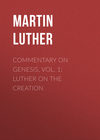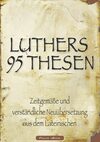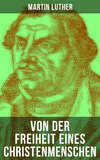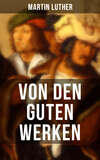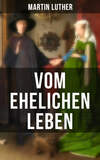Buch lesen: «Commentary on Genesis, Vol. 1: Luther on the Creation»
SECOND INTRODUCTION
—to—
LUTHER'S WORKS IN ENGLISH
This introduction or prospectus is supplementary to that in the first volume on the Psalms, in that it likewise emphasizes, though from different view-points, the history and fruits, as well as the present need and future mission of the Protestant Classics of the greatest of all reformers in their relation to the development of the human race.
Let us in this introduction briefly notice the following: The progress of the movement to translate and circulate Luther's works in English, and then emphasize the need of developing an interest to read them; first, because of the relation of Luther and his writings to the public library; and secondly, because as the chief of the Teuton Protestant Church Fathers, we need to understand Luther in his relation to the Greek and Latin Church Fathers, and our true historic relations to them all.
THE PROGRESS OF THE MOVEMENT
With profound gratitude to Almighty God for his rich blessing bestowed upon the publication and quick sale of the first volume, Luther's Commentary on the Psalms, a book "the mourning soul cannot well be without," we now send forth the first volume of his Commentary on Genesis, with the confidence that those, who think with Melanchthon that "a single page of Luther contains more sound divinity than many whole volumes," will not change their opinion by studying this volume. Having purchased all the copies of Luther on Galatians and his Notes on the Gospels by Dr. P. Anstadt, and the right to reprint them, with two other volumes about ready for the press, one by Prof. E. F. Bartholomew, D.D., and another by Dr. Bernhard Pick, our progress is encouraging, especially since the movement has taken an intersynodical character with colaborers from every branch of our polyglot communion.
LUTHER ON THE OLD TESTAMENT NEEDED FIRST
This volume on Genesis follows the first volume on the Psalms because the volumes ought to be published first that are needed most and will do the most good. As Professor of Old Testament Exegesis I found that like "Luther on the Psalms" so "Luther on Genesis" was not accessible to the English, Swedish, Norwegian and Danish students of theology, Prof. Bugge's Norwegian translation of extracts from it being out of print. Therefore we believe this volume also will be welcomed by all Old Testament professors and students. While both these volumes will be a healthy corrective to the Old Testament critics, their contribution to the biblical knowledge and the devotional life of Protestantism cannot be exaggerated. Though first delivered to critical students they have also been extensively read in family worship. Luther began and closed his blessed ministry in the church of God not by fighting the Pope, but by expounding the Word of God. He began by explaining the whole Psalter from 1513 to 1516 (before 1517) forming volumes III and IV of the Kaiser Chronological Edition and closed his life's labors by expounding the first book of the Bible, Genesis, which composes volumes I and II of the St. Louis Walch edition. He commenced with the penitential Psalms of David and ended with Moses, the earliest writings of the Old Testament. The reason so many preachers and congregations neglect the Old Testament is because it is neglected in the seminaries. God willing a volume of Luther on the Prophetical Books will be issued and then in all three years at the seminary the students may have something of Luther on the Pentateuch, Psalms and Prophets.
LUTHER'S WORDS ON PUBLIC LIBRARIES
In the recent marvelous development of public libraries it is held if it is the duty of the state to teach the child to read for the welfare of the child and of the state, it is also the duty of the state to offer the child something to read. Hence the library is being supported by taxation like the public school, and the library buildings are being erected near the high schools. It is as President Roosevelt said while west recently, our civilization rests on the church, the school and the library. The library is the child of the church and school and will in turn greatly influence both. Luther, the founder of the Protestant Church, and the founder of the Public School, is also the founder of the Protestant Library. Yea, more, nearly four hundred years ago he united the school and the library as is proved by the following:
It is noteworthy that Luther closes his "Address to the Mayors and Aldermen of all the Cities of Germany in behalf of Christian Schools," which is considered by educators for its pioneer character and statements of principles "the most important educational treatise ever written," by a powerful appeal in behalf of public libraries which I give in full from Luther on Education by Prof. Painter.
Luther concludes that great educational treatise thus:
"Finally, this must be taken into consideration by all who earnestly desire to see such schools established and the study of the languages preserved in the German states; that no cost nor pains should be spared to procure good libraries in suitable buildings, especially in the large cities that are able to afford it. For if a knowledge of the Gospel and of every kind of learning is to be preserved, it must be embodied in books, as the prophets and apostles did, as I have already shown. This should be done, not only that our spiritual and civil leaders may have something to read and study, but also that good books may not be lost, and that the arts and languages may be preserved, with which God has graciously favored us. St. Paul was diligent in this matter, since he lays the injunction upon Timothy, 'Give heed to reading,' I Tim. 4:13, and directs him to bring the books, but especially the parchments left at Troas, 2 Tim. 4:13.
"All the kingdoms that have been distinguished in the world have bestowed care upon this matter, and particularly the Israelites, among whom Moses was the first to begin the work, who commanded them to preserve the book of the law in the ark of God, and put it under the care of Levites, that any one might procure copies from them. He even commanded the king to make a copy of this book in the hands of the Levites. Among other duties, God directed the Levitical priesthood to preserve and attend to the books. Afterwards Joshua increased and improved this library, as did subsequently Samuel, David, Solomon, Isaiah, and many kings and prophets. Hence have come to us the Holy Scriptures of the Old Testament, which would not otherwise have been collected and preserved, if God had not required such diligence in regard to it.
"After this example collegiate churches and convents formerly founded libraries, although with few good books. And the injury from the neglect to procure books and good libraries, when there were men and books enough for that purpose, was afterwards perceived in the decline of every kind of knowledge; and instead of good books, the senseless, useless, and hurtful books of the monks, the Catholicon, Florista, Graecista, Labyrinthus, Dormi Secure (names of Latin grammars and collections of sermons), and the like, were introduced by Satan, so that the Latin language was corrupted, and neither good schools, good instruction, nor good methods of study remained. And as we see, the language and arts are, in an imperfect manner, recovered from fragments of old books rescued from the worms and dust; and every day men are seeking these literary remains, as people dig in the ashes of a ruined city after treasures and jewels.
"Therein we have received our just due, and God has well recompensed our ingratitude, in that we did not consider his benefits, and lay up a supply of good literature when we had time and opportunity, but neglected it, as if we were not concerned. He in turn, instead of the Holy Scriptures and good books, suffered Aristotle and numberless pernicious books to come into use, which only lead us further from the Bible. To these were added the progeny of Satan, the monks and the phantoms of the universities, which we founded at incredible cost, and many doctors, preachers, teachers, priests and monks, that is to say, great, coarse, fat fellows, adorned with red and brown caps, like swine led with a golden chain and decorated with pearls; and we have burdened ourselves with them, who have taught us nothing useful, but have made us more and more blind and stupid, and as a reward have consumed all our property, and filled all the cloisters, and indeed every corner with dregs and filth of their unclean and noxious books, of which we cannot think without horror.
"Has it not been a grievous misfortune that a boy has hitherto been obliged to study twenty years or longer, in order to learn enough miserable Latin to become a priest and to read the mass? And whosoever has succeeded in this has been called blessed, and blessed the mother that has borne such a child! And yet he has remained a poor ignorant man all through life, and has been of no real service whatever. Everywhere we have had such teachers and masters, who have known nothing themselves, who have been able to teach nothing useful, and who have been ignorant even of the right methods of learning and teaching. How has it come about? No books have been accessible but the senseless trash of the monks and sophists. How could the pupils and teacher differ from the books they studied? A crow does not hatch a dove, nor a fool make a man wise. That is the recompense of our ingratitude, in that we did not use diligence in the formation of libraries, but allowed good books to perish, and bad ones to survive.
"But my advice is not to collect all sorts of books indiscriminately thinking only of getting a vast number together. I would have discrimination used, because it is not necessary to collect the commentaries of the jurists, the productions of all the theologians, the discussions of all the philosophers, and the sermons of all the monks. Such trash I would reject altogether, and provide my library only with useful books; and in making the selection I would advise with learned men.
"In the first place, a library should contain the Holy Scriptures in Latin, Greek, Hebrew, German and other languages. Then the best and most ancient commentators in Greek, Hebrew and Latin.
"Secondly, such books as are useful in acquiring the languages, as the poets and orators, without considering whether they are heathen or Christian, Greek or Latin. For it is from such works that grammar must be learned.
"Thirdly, books treating of all the arts and sciences.
"Lastly, books on jurisprudence and medicine, though here discrimination is necessary.
"A prominent place should be given to chronicles and histories, in whatever language they may be obtained; for they are wonderfully useful in understanding and regulating the course of the world, and in disclosing the marvelous works of God. O, how many noble deeds and wise maxims produced on German soil have been forgotten and lost, because no one at the time wrote them down; or if they were written, no one preserved the books; hence we Germans are unknown in other lands, and are called brutes that know only how to fight, eat and drink. But the Greeks and Romans, and even the Hebrews have recorded their history with such particularity, that even if a woman or child did anything noteworthy, all the world was obliged to read and know it; but we Germans are always Germans and will remain Germans.
"Since God has so graciously and abundantly provided us with art, scholars and books, it is time for us to reap the harvest and gather for future use the treasures of these golden years. For it is to be feared (and even now it is beginning to take place) that new and different books will be produced, until at last, through the agency of the devil, the good books which are being printed will be crowded out by the multitude of ill-considered, senseless and noxious works. For Satan certainly designs that we should torture ourselves again with Catholicons, Florists, Modernists and other trash of the accursed monks and sophists, always learning, yet never acquiring knowledge.
"Therefore, my dear sirs, I beg you to let my labor bear fruit with you. And though there be some who think me too insignificant to follow my advice, or who look down upon me as one condemned by tyrants; still let them consider that I am not seeking my own interest, but that of all Germany. And even if I were a fool, and yet should hit upon something good, no wise man should think it a disgrace to follow me. And if I were a Turk and heathen, and it should yet appear that my advice was advantageous, not for myself, but for Christianity, no reasonable person would despise my counsel. Sometimes a fool has given better advice than a whole company of wise men. Moses received instruction from Jethro.
"Herewith I commend you all to the grace of God. May he soften your hearts, and kindle therein a deep interest in behalf of the poor, wretched and neglected youth; and through the blessing of God may you so counsel and aid them as to attain to a happy Christian social order in respect to both body and soul, with all fullness and abounding plenty, to the praise and honor of God the Father, through Jesus Christ our Saviour. Amen."
Wittenberg, 1524.
In his "Table Talk" Luther continues thus:
"The multitude of books is a great evil. There is no measure or limit to this fever for writing; every one must be an author; some out of vanity, to acquire celebrity and make a name; others for the sake of lucre and gain. The Bible is now buried under so many commentaries, that the text is not regarded. I could wish that all my books were buried nine ells deep in the ground, by reason of the ill example they will give, every one seeking to imitate me in writing many books, with the hope of procuring fame. But Christ died not to favor our ambition and vain-glory, but that his name might be glorified.
"The aggregation of large libraries tends to direct men's thoughts from the one great book, the Bible, which ought, day and night, to be in every man's hand. My object, my hope, in translating the Scriptures, was to check the so prevalent production of new works, and so to direct men's study and thoughts more closely to the divine Word. Never will the writings of mortal man in any respect equal the sentences inspired by God. We must yield the place of honor to the prophets and apostles, keeping ourselves prostrate at their feet as we listen to their teaching. I would not have those who read my books, in these stormy times, devote one moment to them which they would otherwise have consecrated to the Bible."
LUTHER THE FATHER OF MODERN LIBRARIES
The foregoing literal quotations on the library; its divine origin and its biblical and ecclesiastical development from the time of Moses; its interlingual and international importance; its satanic and anti-Christ-like dangers; its true mission and relation to the church, school, family and state; the comprehensive sample catalogue of a model library; and the words that when libraries tend to direct men's thoughts from or against the one great Book they are complete failures; these and other like thoughts of Luther, who was born only 15 years after the death of Guthenburg, his countryman, the inventor of printing; these words so warm, clear and wise of the hero of the Reformation, uttered nearly 400 years ago, prove that Luther and not Franklin was the father or founder of modern libraries of printed books and documents.
In W. T. Fletcher's "Public Libraries In America," of the Columbian Knowledge Series, published in Boston, 1899, we read on page 10, "But when did the public library movement begin? Not even the Reformation, with its tremendous assertion of the right of man to spiritual freedom, brought about the change so designated. Franklin more than any other originated this movement." It is strange that in all the recent and growing bibliography on the library there is little or no tendency to trace the origin of the Protestant library to the Protestant Reformation. Yet Mr. Fletcher says on p. 37, "It is a significant fact that everywhere the clergy are found foremost in advancing the library movement." He certainly does not mean the Catholic clergy.
If you examine the libraries of our day and judge from their contents and spirit, the conclusion irresistibly comes to one that they do not know their own father or founder. Their walls often are decorated with fine pictures of illustrious men, Carnegie and other liberal donors; but in no public library, not even in districts of our country where the German and Scandinavian taxpayers are in the majority do we find a picture on their walls, "Martin Luther, the Founder of the Library Among the Protestant Teutonic Nations." Though Carnegie should expend all his fortune on libraries alone, his donation to the library idea would be unworthy to be compared with that of Luther. Besides what Luther wrote urging the Teutonic nations accepting his teachings to erect libraries or "book houses" as he called them, and besides what he did in other ways to encourage the collection of the writings of the Germanic nations, this Teuton of the Teutons, their child and father, born, as I said, only fifteen years after the inventor of printing died, wrote a library of 113 volumes in the infancy of printing, which is still today the leading classic library of Protestantism, which has been translated and retranslated in part into every language of the globe and influenced every Protestant and many Catholic authors, and is or should be the foundation and center of every library that is not anti-Protestant. Alas! Alas! It is not so in our own Protestant land, the United States. He seems to be feared more as a leader of a sect, which he never was, than loved and honored as the hero of the Reformation and the very soul of the Protestant Teutonic literary activity and its treasures. However I am not so greatly concerned to have Luther honored as the father of the modern library by hanging his picture on their walls. There is a better way for the Protestant library to honor their father and that is to purchase his writings complete in the German, Scandinavian and English languages and then interest their German, Scandinavian and English citizens to read them. True some libraries have a dozen or more books written about Luther, his life, etc., but not a single book written by him. All the books that others have or may write about him are as nothing compared to what he himself wrote in explaining the Holy Scriptures and the fundamental principles of our modern aggressive Protestant civilization. If they are the happy possessors of a few books translated from our great Teuton church father, the books are often in such poor and antiquated English that no one can nor will read them with any comfort. Librarians and pastors and Protestant laymen, what have you up-to-date in your library from the heart and pen of the father of Protestant literature? Look now and see, and make a note of what you find and write us, and we may be of some help to you in completing your collection.
But what is the use for libraries to purchase Luther's works in German, Scandinavian or English when the people do not call for the books and read them. Therefore we have given emphasis to their cry that is going abroad in the land.
READ LUTHER! READ LUTHER!! READ LUTHER!!!
Why? Because as a true intelligent Protestant you cannot read any thing better. Millions of people have said and millions more will say next to the Bible they received more from Luther's writings than from all other books combined. And if you take the Protestant professors of our land, and for that matter of all lands, they all together would come far short of making a Luther. He was not only ahead of his times, but on many subjects he is far ahead of our age. Yes, when we keep company with Luther we feel we are behind the times, on subjects like Romanism, Protestantism, Christian schools, Christian libraries, the Christian family, the Christian state, and many Christian social problems. It is possible to go backwards as well as forwards.
How can I read Luther when I have not his books and I cannot afford to purchase them? Our cry is not Buy Luther! Buy Luther!! Buy Luther!!! But Read Luther! Read Luther!! Read Luther!!! Many buy Luther's works and do not read them. They can afford to purchase them all and as they have a beautiful book-case with glass doors, perhaps the finest piece of furniture in their homes, as the style now is (for what is a home without an up-to-date book-case?), they subscribe for all Luther's works for a show in their book-case, and we ask can you name a set of books that makes a better show in any public or private library than Luther's works, especially in a Protestant library? They are also really a far better investment than these large, thick, cheap but dear, subscription books, which are nice only while they are new and then they fade and the outside becomes as bad as the inside. When you look at the libraries of many Protestant homes, you pity them, first because of what they have not and then because of what they have.
But Luther's writings should go into the home library not for a show nor for an investment, but to be read. Perhaps there is no passage of Scripture that our homes should take to heart just now more than the advice of Father Paul to his spiritual son, Timothy: "Give heed to reading, to exhortation, to teaching. Neglect not the gift that is in thee." 1 Tim. 4:13-14. Give heed that you read something, that you read the best, and give heed how you read, that the gifts in you may not be neglected. Then the right, sound exhortation and pure teaching will follow. Notice the order is first, give heed to reading. Many have never read any writings of Luther except perhaps his small catechism. They have not built very well on the foundation laid. When one thinks of the solid Christian books our German and Scandinavian parents read and what the children read now-a-days, you must sigh.
Again many say I have now more books than I can read and if I buy more I will not read them. Well, you will not lose much if you do not read many books you have, but if you would sell these and buy a few of the classic writings of Protestantism and read and read them again and again, you would be blessed, and just such a work is Luther on Genesis.
NO ONE IS TOO POOR TO BE A LUTHER READER
I have spoken of those who can afford to buy Luther's works and do buy them, and yet they do not read them. There is another class much smaller but much better; namely, those who enjoyed the study of their catechism and the little they have read here and there in extracts from Luther and they long to read more, but do not know where to get the books or have not the money to buy them. To all such let our pastors, parochial and Sunday school teachers and all others say on every occasion possible that such works can be had in the public library. If you do not find them there make application on the little blank slips the library furnishes for the public to request the library to secure the books desired. If they do not do so at once have your neighbors repeat and repeat the same request. This is the way the latest trashy novels are introduced in public libraries, for they buy only what the public asks for. These libraries are supported as a rule by taxation and the Germans and Scandinavians are heavy taxpayers and their requests for good standard books in their own language or in English will be favorably considered. We ourselves are to blame if public libraries have not the standard classics of their Protestant father and founder.
It if therefore in harmony with historic development and with the spirit of Luther that in Chicago, June 29, 1903, an adjourned meeting of the convention, which assembled in the same city in September of the previous year, was held and effected an organization known as the
NATIONAL LUTHERAN LIBRARY ASSOCIATION
one aim of which as specified in its constitution, is "To aid in duplicating as far as practicable the 'Luther' literature in the British Museum Library in all the larger American Public Libraries." (See the constitution for further details.) The public libraries of Great Britain are far ahead of the American public libraries in their Luther literature, and we as free loyal Americans cannot afford to let it continue so.
The question arises, what nations, what culture should characterize the libraries of the world? Shall the Greeks, or the Latins or the Teutons? To aid in answering this question I will add another heading
THE GREEK, LATIN AND TEUTON CHURCH FATHERS
In the Introduction of Vol. I in the Psalms, to which the reader is referred, it was stated that the key-note of all of the "sacred books" of the East is "Salvation by Works." And yet in the face of this Protestants are asked to believe that they are "sacred books," when their main teachings are directly contrary to what we have been taught to esteem as most sacred, namely, our Christian faith in the grace of Christ for salvation. To Protestants they are not sacred books but the very opposite. I would far rather call the writings of Luther sacred, which teach and defend the doctrine of salvation by grace as taught by the one great Book, although it stands alone and protests against the false teachings of the so-called sacred books of the east.
However let us now look more closely at the west. Here we find that Protestants have shown commendable zeal and enterprise in translating, publishing and circulating the large libraries of the Greek and Latin church fathers. Every pastor continuously receives circulars with the almost irresistible temptation to purchase the patristic writings of both Catholic churches. This is all well, but we should not forget that the Anglo-Saxon people are neither Greeks nor Latins, but Teutons, and that our Teuton church fathers are Protestants and they also should be translated, published, circulated and read and taught. Little Wittenberg dare not fall behind Constantinople and Rome. It ought not.
For "Saxon and Norman and Dane are We."
True the Teutons can and do learn from the Greek and Latin church fathers, but we also believe that the children of the old Greeks and Latins can learn much from our Teuton fathers, and that they have as good reasons to welcome our classic church literature as we have theirs; and we hope the day may soon come when they will translate and read ours as faithfully and impartially as we do theirs. What a blessing that would bring to Christendom!
In some quarters however English Protestants have been in danger of appreciating the fathers of the Greeks and Latins to the extent of neglecting to give due honor to their own. Many Protestant ministers' libraries contain all classics except the Protestant classics. Let the whole world have the Greek and the Latin fathers as it has, but let Protestants awake and give the world theirs. Is it not a shame and a pity that while all the writings of the Greek and Latin fathers have been translated into many languages, yet the complete works of Luther, the first and chief of the Protestant fathers, have never been translated into any language, though his loyal disciples are numbered by the hundreds of thousands in different tongues, as the fruits of those writings? For of the 70,169,000 Lutherans in the world, 43,731,000 speak German, 7,300,000 Swedish, 3,500,000 Norwegian, 3,200,000 Danish, 3,000,000 Finnish, 1,100,000 Esthnish, 400,000 Hungarian (or 4,500,000 of the Finnish or Magyarian race), 4,000,000 English, 2,000,000 Lettish, 500,000 Slovakian, 300,000 Polish, 200,000 French, 100,000 Dutch, 100,000 Russian, 82,000 Icelandic, 50,000 Bohemian, 63,000 Wendish, 113,000 Lithuanian, 250,000 the heathen dialects of Asia and 280,000 the heathen dialects of Africa. And further as all German speaking Reformed churches use Luther's version of the Scriptures, so they welcome his writings also.
True in all these 17 or more languages some of Luther's writings have appeared. But it is distressing to learn how few they are, and how out of date and imperfect some of these are. Luther is the common property of all Protestants, and so are his writings. They would be helpful in all time to the 21,000,000 Episcopalians, the 17,000,000 Methodists, the 11,000,000 Baptists, the 9,000,000 Presbyterians, the 4,500,000 Congregationalists, and all other Protestants; and not only to the 140,000,000 Protestants, but also to the 80,000,000 Greek Catholics and 200,000,000 Latin Catholics and to the heathen, to the infidel, to the state as well as to the church. The first thing for Protestants to do is to give all nations the Bible; and the second, to give them the best Protestant classics. We can. Will we?
No nation or race is greater than its greatest men, and those greatest men are not greater than their best writings. Hence little is of more value in literature than the honest critique by these greatest men of the best writings of the most civilized and cultured nations before their time. Therefore of the greatest interest are the following
CRITICISMS OF THE GREATEST TEUTON CHURCH FATHER ON THE GREEK AND LATIN CHURCH FATHERS
They are taken literally from his Table Talk and read thus: I will not presume to criticise too closely the writings of the fathers, seeing they are received of the church, and have great applause, for then I should be held an apostate; but whoever reads Chrysostom, will find he digresses from the chief points, and proceeds to other matters, saying nothing, or very little, of that which pertains to the subject. When I was expounding the Epistle to the Hebrews, and turned to what Chrysostom had written upon it, I found nothing to the purpose; yet I believe that he at that time, being the chief rhetorician, had many hearers, though he taught without profit; for the chief office of a preacher is to teach uprightly, and diligently to look to the main points and foundation on which he stands, and so instruct and teach the hearers that they understand aright and may be able to say: This is well taught. When this is done, he may avail himself of rhetoric to adorn his subject and admonish the people.
